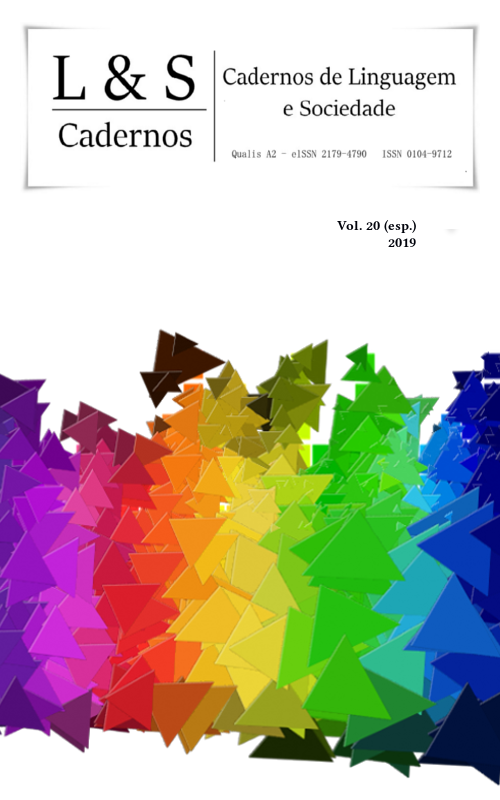From prejudice to (im)politeness: social, ideological and linguistic aspects that produce racist and sexist practices on facebook
DOI:
https://doi.org/10.26512/les.v20i3.28632Keywords:
Face, (Im)politeness, Racial Prejudice, SexismAbstract
Virtual interactions are often an extension of face-facing encounters, solidifying in digital spaces as the discursive discourse of racism and sexism practices. Starting from the studies of Sociology, Pragmatics and Interactional Sociolinguistics, our goal is to understand, from Fanon (2008), Van Dijk (2017) Brown and Levinson (1987) and Culpeper (1996; 2011), as the prejudice of materializing in (im) language policy through Facebook posts. We conducted a qualitative, exploratory and descriptive survey whereby we selected a post in a Facebook group about a possible case of harassment between a foreign student and a brazilian student. For this, it selects and analyzes as the most relevant answers, according to the criteria of the social network itself. The results demonstrated how politeness strategies were used both to create a positive image of the potential offender and to solicit support from group members in relation to him; In addition, there is condensation between politeness and impoliteness strategies when the effect was to attack one of the group members, the victim or the supposed aggressor himself. Our investigation shows the historical, ideological, social and contextual foundations for the event, as well as an analysis of the politeness and impoliteness strategies applied by the group participants. Conclude that the statements seek alternate between politeness and linguistic impoliteness for the production of biased messages.
Downloads
References
ALLPORT, G. W. The nature of prejudice. New York: Basic books, 1979.
AUSTIN, J. L.. Quando dizer é fazer: palavras e ação. Porto Alegre: Artes Médicas, 1990.
BACILA, C. R.. Criminologia e estigmas: um estudo sobre os preconceitos. São Paulo: Atlas, 2015.
BARROS, D.L.P.. A construção discursiva dos discursos intolerantes. In: BARROS, D.L.P.(Org.). Preconceito e intolerância: reflexões lingüístico discursivas. São Paulo: Universidade Presbiteriana Mackenzie, 2011.
BROWN, P.; LEVINSON, S. Politeness: some universals in languageusage. In: GOODY, E. (Ed.). Questions and Politeness. Cambridge: Cambridge University Press, 1978.
BROWN, P.; LEVINSON, S. Politeness: some universals in language usage. Cambridge: University Press, 1987.
CULPEPER, J. Towards an anatomy of impoliteness. Journal of pragmatics, v. 25, n. 3, p. 349-367, 1996. Disponível em: https://www.sciencedirect.com/science/article/abs/pii/0378216695000143 Acesso em: 02 jul. 2019.
CULPEPER, J. Impoliteness: using language to cause offence. New York: Cambridge Press, 2011.
DAVIS, A. Y. Women, race, & class. New York: Vintage, 1981. Disponível em:https://legalform.files.wordpress.com/2017/08/davis-women-race-class.pdf Acesso em: 05 maio 2019.
FANON, F. Pele negra, máscaras brancas. Salvador: EDUFBA, 2008. Disponível em: https://www.geledes.org.br/wp-content/uploads/2013/08/Frantz_Fanon_Pele_negra_mascaras_brancas.pdf Acesso em: 05 maio 2019.
FREYRE, G. Casa grande e senzala: formação da família brasileira sob o regime de economia patriarcal. Rio de Janeiro: Editora Record, 1993.
GOFFMAN, E..Estigma: notas sobre a manipulação da identidade deteriorada. Nova Jersey: Prentice-Hall, 1963.
GOFFMAN, E. Behavior in public places: notes on the social organization of gatherings. New York: Free Press, 1966.
GOFFMAN, E. Interaction ritual: essays on face-to-face behavior. Garden City: Anchor Doubleday, 1967.
GUIMARÃES, A. S. A. Entre o medo de fraudes e o fantasma das raças. Horizontes Antropológicos, v. 11, n. 23, p. 215-217, 2005.
HIRATA, H.. Gênero, classe e raça Interseccionalidade e consubstancialidade das relações sociais. Tempo Social, v. 26, n. 1, p. 61-73, 2014.
KERBRAT-ORECCHIONI, C. Análise da conversação: princípios e métodos. São Paulo: Parábola, 2006.
LAKOFF, G.; JOHNSON, M. Metaphors we live by. University of Chicago Press, 1980.
LAKOFF, R. The logic of politeness; or, minding your P's and Q's. In: CORUM, C.; SMITH-STARK, T. C.; WEISER, A. (Eds.). Papers from the Ninth Regional Meeting of the Chicago Linguistics Society. Chicago: University of Chicago Press, p. 292-305, 1973.
LEITE, M.Q. Preconceito e intolerância na linguagem. São Paulo: Contexto, 2017.
LEECH, G. M. Principles of Pragmatics. London: Longman, 1983.
LEECH, G. N. The pragmatics of politeness. USA: Oxford University Press, 2014.
MARTINS, A. R. D.. A violência linguística virtual contra a mulher: ideologia e estratégias de (im)polidez em blogs. 2013. 161 f. Dissertação (Mestrado em Linguística Aplicada) ”“ Programa de Pós-Graduação em Linguística Aplicada, Universidade Estadual do Ceará, Fortaleza, 2013. Disponível em: http://www.uece.br/posla/dmdocuments/Adriana%20Regina%20Dantas%20Martins.pdf. Acesso em: 02 jul. 2019
MUNANGA, K.. Rediscutindo a mestiçagem no Brasil: identidade nacional versus identidade negra. Petrópolis: Editora Vozes, 1999.
PAIVA, G. M. F.; MOREIRA, R. G.; SANTOS, L. A. P. F. Introdução aos Estudos de (Im)Polidez Linguística. Fortaleza: Centro Universitário Estácio do Ceará, 2016. Disponível em: http://publica-estaciofic.com.br/edicoes/LIVROS/IMPOLIDEZ-FINAL/index.html Acesso em: 02 de julho de 2019.
RIBEIRO, D. O que é lugar de fala? Belo Horizonte: Letramento, 2017.
SEARLE, J. R. Speech acts: an essay in the philosophy of language. Cambridge: Cambridge University Press, 1969
SEARLE, J. R. What is an intentional state? Mind, v. 88, n. 349, p. 74-92, 1979. Disponível em: https://www.jstor.org/stable/2253065?seq=1 Acesso em: 01 jul. 2019.
VAN DIJK. Discurso e poder. São Paulo: Contexto, 2017.
WATTS, J. R. Politeness: key topics in sociolinguistics. Cambridge: Cambridge University Press, 2003.



